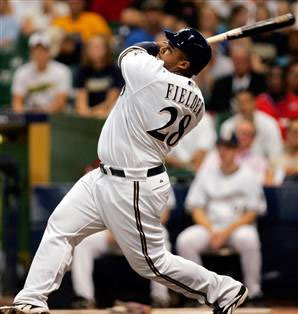It's been a while since I last wrote about the state of our beloved Washington Nationals baseball club. At that time, it was nearing the start of the 2008 season and I was just starting to get excited about the team's chances for improving to the point where it could be taken seriously. And by "taken seriously," that means finishing somewhere other than last in the National League East.
While none of that really happened in the two seasons that followed that post, there were signs of life. Hitters started hitting, young guys started showing up in the lineup and playing decent defense, and the pitching showed improvement. Stephen Strasburg and Bryce Harper were consecutive number one pics in the draft and promise big things down the road.
The team made a big splash to start the 2011 season with a seven-year deal to free agent Jayson Werth. I wasn't a fan of a contract that went on that long, but sometimes that has to be done to show that a team is not willing to stand pat and let other teams snap up available players. While the first year of the Werth era wasn't record-setting, it was still encouraging as the Nationals wound up third in the division with some real up-and-coming players leading the way.
 We're midway through the off-season between 2011 and 2012, and the buzz is about Prince Fielder. The soon-to-be-former Milwaukee Brewer first baseman is going to command money that will place him at or near the highest-paid players of all time. He should, as he's proven to be a durable player capable of producing 35+ home runs and 110+ RBIs year after year. And he's relatively young, so that production should continue for years down the road.
We're midway through the off-season between 2011 and 2012, and the buzz is about Prince Fielder. The soon-to-be-former Milwaukee Brewer first baseman is going to command money that will place him at or near the highest-paid players of all time. He should, as he's proven to be a durable player capable of producing 35+ home runs and 110+ RBIs year after year. And he's relatively young, so that production should continue for years down the road.
Over the last week, rumors of the Nationals being one of the leading teams in the Fielder sweepstakes. Some of the bloggers are just beside themselves over the possibility of his being added to the local team's lineup. All they can think of is 40 home runs and 120 RBIs in the middle of an already potent lineup. In their Twitter feeds they come just short of demanding the Nationals brass sign the free agent. If they don't, they say, that will show that team ownership and management aren't interested in winning.
Let's hold off on that.
First off, there are already a couple decent first basemen on the team. Adam LaRoche hasn't had a fair shake yet. He started last year slow, but he was playing in pain that eventually led to season-ending surgery. Now healthy, he should resume his 20+ home run production pace. There's also Michael Morse. He's in left field now, but he spent most of 2011 playing first base in LaRoche's absence and not only played good defense there, but had a 31 home run year.
Offensively, Fielder's 40 home runs would replace LaRoche's 20. How big a difference will those additional 20 homers make? Will they get the team ten more wins? Not likely. The cost per home run added would be staggering as well.
All along, Nationals brass has said that the off-season acquisition targets should be a center fielder and starting pitching. Fielder is neither. Just because he's available doesn't mean he should be in Washington. His price tag is going to be far too high for his additional offensive production, and with as many years as he'll wind up signing for, he, being a big boy, is going to get less and less effective as a first baseman. His best landing place with a long-term deal is an American League team where he can eventually transition into a designated hitter role.
The Nationals have a good thing going right now with a nice combination of home-grown talent and some decent talent acquired through trades and free agency. To dramatically increase profile and payroll over this one player - a player who takes a position where the team already has strength - might be a move in the wrong direction. Yeah, it might work, but how much does the team want to risk to find out?
Besides, I have a selfish reason for not wanting to see Prince Fielder at Nationals Park. The team's decent right now, and is making strides towards competing with the Phillies and the Braves for National League East contention. Meanwhile, it's still an easy ticket for a fan who might make late-day decisions to go to a game. If this team gets too good, too soon, there's the risk that there won't be any cheap seats available for a Tuesday night game when I show up at the box office half an hour before the national anthem. This is a good team, but I don't think I want to see them go this big in an effort to win this year and then not be able to sustain that level of success.
